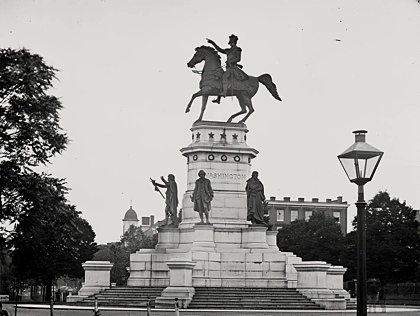The inauguration of Jefferson Davis
It was February 22nd, George Washington’s birthday, and the day Jefferson Davis was to be inaugurated as president of the Confederate States of America.

I think it’s safe to say that we’ve had one heck of a pleasant winter here in Richmond this year. If that’s no longer the case on the date this is published, I suggest blaming Weather Dan. The reason I bring up the weather is that 150 years ago in 1862 it was downright dreadful. Rain. Non-stop rain. While this would be a minor inconvenience in our era of paved roadways, it turned 1862 Richmond into a muddy mess.
Despite all of this, Jefferson Davis had no intention of changing his plans due to the weather. It was February 22nd, George Washington’s birthday, and the day Jefferson Davis was to be inaugurated as president of the Confederate States of America. In this instance, symbolism outweighed practicality. Giving his inaugural address directly in front of the statue of George Washington on the capitol grounds, Davis hoped to be seen in the same light as our country’s first great leader: a “rebel” fighting for independence from tyranny.
Before I elaborate any further on symbolism or the weather, I owe a brief explanation to those who thought Jefferson Davis had already been president for a while now. Davis was inaugurated as a provisional president and chosen by the Confederate Congress to lead until a formal election could be held. When that election took place in November 1861, Davis ran unopposed and was elected to a six-year term.
Now, back to the weather:
Great was the disappointment of the multitude congregated in this city, as they, severally, arose Saturday morning, and discovered that the sky was o’ercast by dark, leaden clouds, from which the rain was dripping copiously. Richmond Whig, 2/24/1862
But, of course, that didn’t stop the citizens of Richmond:
As early as 10 o’clock, A.M., people began to assemble at the Capitol and in the Square. Undaunted by the “dreadful weather,” or innumerable mud puddles and trickling streamlets “under foot,” crowds of ladies repaired to the Capitol to gratify their natural curiosity. The stairways leading to the galleries of the Hall of the House of Delegates were soon occupied by the ladies, who patiently maintained their position until the gallery doors were opened. The galleries were speedily filled, but hundreds of other ladies presented themselves, only to be turned away with the announcement that there was “not an inch of room.”
Several thousand persons were assembled in the Square, protected from the rain by umbrellas until the commencement of the ceremonies, when the order was given to “lower umbrellas.” Those nearest the Monument promptly heeded the request, and for nearly three-quarters of an hour braved the watery element with patriotic devotion.
Davis spoke for about forty-five minutes in a speech that invoked the spirit of Washington, rebuked the Northern government, and praised the sacrifice of the soldiers fighting for their cause. At the close of the speech, the crowd responded with great enthusiasm and a military band struck up “Dixie,” which drew even more cheers.
Interestingly, one of Davis’ harshest criticisms lobbed at the Northern government in his speech was their disregard for the civil liberties of their citizens. This was a reference to Lincoln’s decision to suspend the writ of habeas corpus, giving the U.S. government the ability to arrest suspected Southern sympathizers and secessionists without due process.
Just a few weeks later, Davis would take similar measures to the ones he railed against in his speech.
-
Recommend this
on Facebook -

Report an error
-

Subscribe to our
Weekly Digest




There are 2 reader comments. Read them.